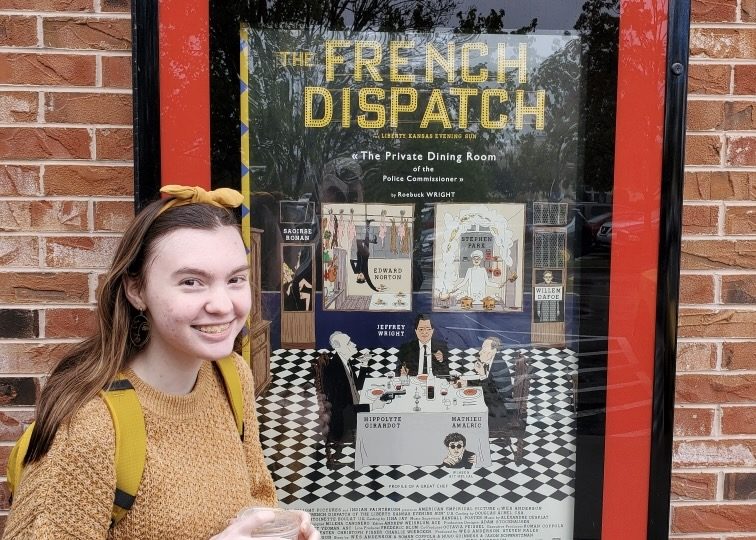The French Dispatch: Review and Commentary
Student journalist Emily Moore after seeing Wes Anderson’s The French Dispatch
November 15, 2021
There are some movies that just click with you, that put you in the mood to do just about anything and to go and live your life to the very fullest. There are some movies that understand the inner-workings of your own soul better than you do, that leave you crying in your seat long after the credits have rolled. There are some movies that grab ahold of your eyes from the very first scene and refuse to let go, and haunt the backs of your eyelids.
And then there is The French Dispatch, Wes Anderson’s newest film, which checks all of those boxes.
The French Dispatch is Anderson’s tenth film, and details an “American newspaper outpost in a fictional 20th century French city that brings to life a collection of stories published in ‘The French Dispatch of the Liberty, Kansas Evening Sun,’” and truly shows that practice makes better: it truly feels like one of Anderson’s best films yet.
The cast consists largely of Anderson’s usual suspects, such as Owen Wilson, Adrien Brody, Bill Murray and Tilda Swinton. However, the film also sees new faces in the Andersonian Universe, such as Benicio Del Toro, Jeffery Wright, and Timothee Chalamet. The French Dispatch also sees Lyna Khoudri’s break-out role as “Juliette,” who plays alongside Chalamet’s character “Zeffirelli.”
Adrien Brody’s performance as “Julien Caddazio” is stellar as always, and he plays wonderfully alongside Benicio Del Toro’s “Moses Rosenthaler.”
Timothee Chalamet’s performance as “Zeffirelli” highlights Chalamet as a natural in the Andersonian Universe, almost as if he is a caricature, drawn for the purpose of acting in a Wes Anderson film. Additionally, Jeffery Wright does an equally wonderful job in his portrayal of Roebuck Wright. His story in the “Tastes and Smells” section was my particular favorite, but I will discuss this at length later on.
Despite all of these new faces, the film does not fail to deliver on its Andersonian promises. One of the film’s main devices is constant switching between black and white to color to reflect the difference between past and present and the drier and more emotionally potent moments in the film, which provides lovely visual storytelling. Uniquely, even for a Wes Anderson film, there is a sprinkling of 2-D animation, which adds a nice touch of variety to the film’s already wonderfully quirky style. Of course, there is Anderson’s signature knolling or overhead tableau shots, extreme symmetry and centered mise-en-scene, and cutting things in half. (And yes, there are scene cards with perfectly quirky titles in a perfectly quirky font.)
The main song of the film, a cover of Christophe’s “Aline” by Jarvis Cocker, is what I believe heaven to sound like. It adds just the right amount of je ne sais quoi to the film’s already melancholy mood, and is currently on every Spotify playlist I use.
The film is separated into three sections : three stories told by three different journalists on The French Dispatch’s staff. (Anderson has recently had a penchant for “vignettes,” as seen with the extreme separation of the story parts in The Grand Budapest Hotel.)
Of the three stories, the third one, written by Roebuck Wright (Jeffery Wright) in the “Tastes and Smells” section, was my favorite. It said to me, as I sat in the nearly empty theater, “I know what it is like. I understand.”
The whole story is, in my opinion, about what it means to be a writer, and in turn, what it means to be alone. Instead of “a love letter to journalism,” I believe it is a love letter to the lonely art of writing in general.
While I am going to refrain from telling the entire story in this review- there would be no reason to see the film if I did- you have to trust me when I tell you this: When you find a movie that understands you like The French Dispatch understood me, it becomes your favorite. The fact that someone can latch onto a film like that and cling fast to it and how it can keep you crying in your seat after the credits should tell you that the film in question is worth its salt in some way. In my opinion, The French Dispatch is worth much more than just its salt.
Overall, if you are a Wes Anderson fan, this movie will not disappoint. It hosts a variety of story-telling mediums, hilarious dead-pan dialogue, and the classic, candied look that all Wes Anderson fans wish their lives looked like. And if you’re not a fan already, The French Dispatch just might be the place to start.




